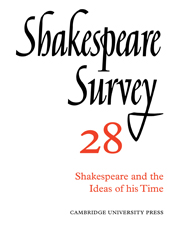Book contents
- Frontmatter
- ‘Richard II’ and the Realities of Power
- The Politics of Corruption in Shakespeare’s England
- Literature without Philosophy: ‘Antony and Cleopatra’
- Self-consciousness in Montaigne and Shakespeare
- ‘Measure for Measure’: The Bed-trick
- Shakespeare and the Doctrine of the Unity of Time
- ‘Coriolanus’ and the Body Politic
- ‘Titus Andronicus’, iii, i, 298–9
- ‘The Merchant of Venice’ and the Pattern of Romantic Comedy
- The Integrity of ‘Measure for Measure’
- ‘To Say One’: An Essay on ‘Hamlet’
- ‘The Tempest’ and King James’s ‘Daemonologie’
- Sight-lines in a Conjectural Reconstruction of an Elizabethan Playhouse
- The Smallest Season: The Royal Shakespeare Company at Stratford in 1974
- The Year's Contributions to Shakespearian Study 1 Critical Studies
- 2 Shakespeare’s Life, Times, and Stage
- 3 Textual Studies
- Index
- Plate section
‘Richard II’ and the Realities of Power
Published online by Cambridge University Press: 28 March 2007
- Frontmatter
- ‘Richard II’ and the Realities of Power
- The Politics of Corruption in Shakespeare’s England
- Literature without Philosophy: ‘Antony and Cleopatra’
- Self-consciousness in Montaigne and Shakespeare
- ‘Measure for Measure’: The Bed-trick
- Shakespeare and the Doctrine of the Unity of Time
- ‘Coriolanus’ and the Body Politic
- ‘Titus Andronicus’, iii, i, 298–9
- ‘The Merchant of Venice’ and the Pattern of Romantic Comedy
- The Integrity of ‘Measure for Measure’
- ‘To Say One’: An Essay on ‘Hamlet’
- ‘The Tempest’ and King James’s ‘Daemonologie’
- Sight-lines in a Conjectural Reconstruction of an Elizabethan Playhouse
- The Smallest Season: The Royal Shakespeare Company at Stratford in 1974
- The Year's Contributions to Shakespearian Study 1 Critical Studies
- 2 Shakespeare’s Life, Times, and Stage
- 3 Textual Studies
- Index
- Plate section
Summary
There is a scene in an Elizabethan play on the reign of Richard II – the play, anonymous and without title, of uncertain date and theatrical provenance, now commonly called Woodstock or Thomas of Woodstock – in which one of the caterpillars of the commonwealth enters the royal presence poring over a book. ‘How now, what readst thou, Bushy?’, asks the King. To which his favourite replies:
The monument of English Chronicles,
Containing acts and memorable deeds
Of all your famous predecessor kings.
This book – is it Holinshed (a bit large for the purpose) or Stow evoked in a kind of surreal flash-forward? – holds examples, strange and wonderful, of treason and conquest applicable to Richard’s own predicament. The information on which he eagerly seizes, however, is more prosaic. Bushy reads: ‘Upon the 3rd of April 1365 was Lord Richard, son to the Black Prince, born at Bordeaux.’ ‘1365 . . .’, muses the King. ‘What year is this?’ (This is one of those plays in which characters ask the year, presumably more for the spectators’ benefit than their own; it is not dramaturgy of a Shakespearian order.) The year, it turns out, is 1387.Thus does it dawn on Richard that he has reached his majority. He can now claim his birthright, the throne of England, and set in motion the catastrophic sequence of events which will lead to his fall.
The episode illustrates the education of a prince and furnishes another instance - if one were needed - of the uses of literacy. The sequel in Woodstock properly reminds us of the caution we must exercise in making use of written memorials. Woodstock yields up the mace of his office of Lord Protector (an office that the historical Woodstock did not enjoy) with good grace, but not without glancing sceptically at the authority which the King has consulted:
And yet I think I have not wronged your birthright: For if the times were searched, I guess your grace Is not so full of years till April next.
- Type
- Chapter
- Information
- Shakespeare Survey , pp. 1 - 14Publisher: Cambridge University PressPrint publication year: 1975
- 1
- Cited by

